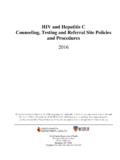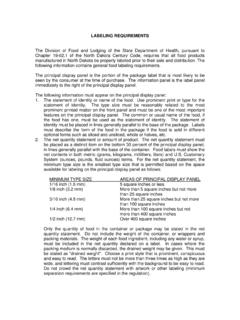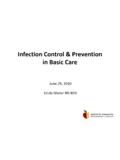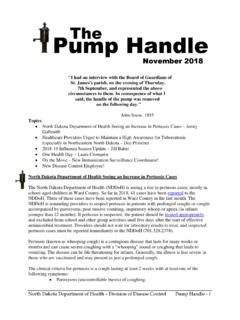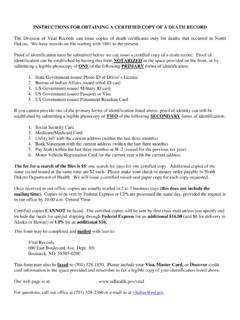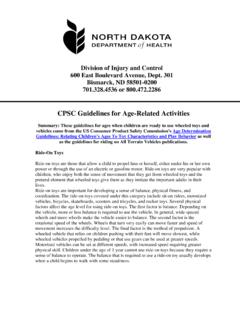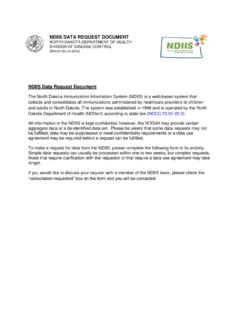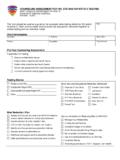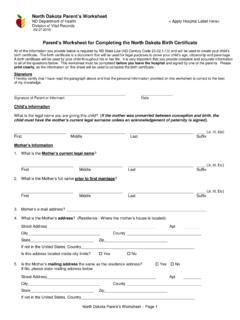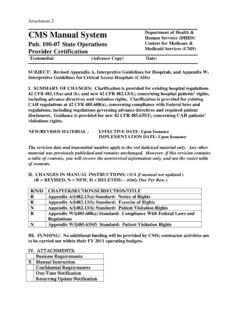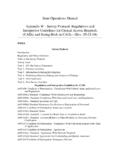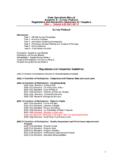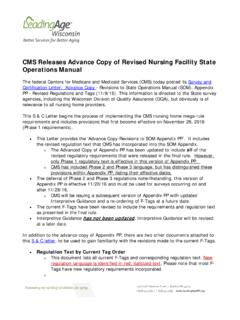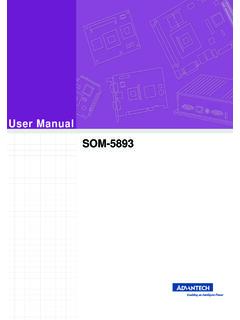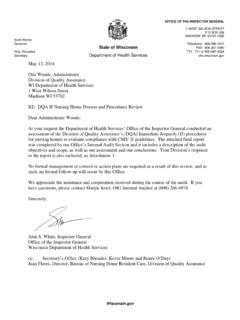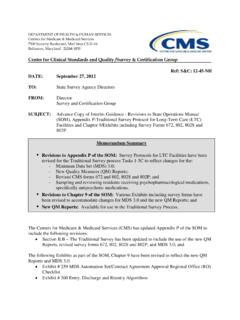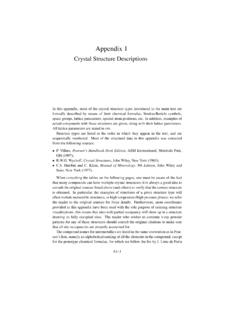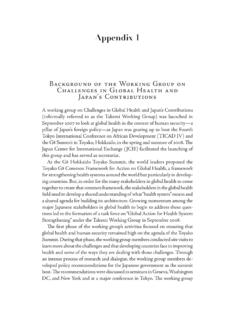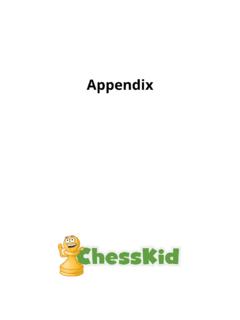Transcription of State Operations Manual Appendix J - Guidance to …
1 State Operations Manual Appendix J - Guidance to surveyors : intermediate care facilities for Persons With Mental Retardation Part 1 - Investigative Procedures for intermediate care facilities for Persons With Mental Retardation I - Introduction II - Principal Focus of Surveys III - Survey Process A - Fundamental Survey B - Extended Survey C - Full Survey IV - Components of Active Treatment A - Comprehensive Functional Assessment (42 CFR (c)(3)). B - Individual Program Plan (IPP) (42 CFR (c)). C - Program Implementation (42 CFR (d)). D - Program Documentation (42 CFR (e)). E - Program Monitoring and Change (42 CFR (f)). V - Task 1 - Sample Selection A - Purpose of the Sample B - Sample Size C - Sample Selection 1 - facilities Serving 100 or Fewer Individuals 2 - facilities With Over 100 individuals 3 - Alternate Sampling Procedure D - Program Audit Approach E - Sampling on Follow-Up Survey VI - Task 2 - Review of Facility Systems to Prevent Abuse.
2 Neglect and Mistreatment and To Resolve Complaints VII -Task 3 - Individual Observations A - Purpose B - Survey Conduct C - Observation Procedure 1 - General Impressions 2 - Specific Activities and Interactions 3 - Individuals in Sample 4 - Areas for Further Observation D - Documentation VIII - Task 4 - Required Interviews With Individuals and/or Family/Advocate Direct care Staff A - Purpose B - Interview Procedure C - Content of Indepth Interviews D - Suggested Interview Questions E - Interviews to Clarify Observations F - Documentation IX - Task 5 - Drug Pass Observation X - Task 6 - Visit to Each Area of Facility Serving Certified Individuals A - Purpose B - Protocol XI - Task 7 - Record Review of Individuals In the Sample A - Introduction B - The Individual Program Plan (IPP). C - Program Monitoring and Change D - Health and Safety Supports XII - Task 8 - Team Assessment of Compliance and Formation of the Report of ICF/MR.
3 Deficiencies A - General B - Team Assessment of Compliance C - Analysis 1 - Facility Practice Statements 2 - Condition Level Compliance Principles D - Composing the Report of ICF/MR Deficiencies (CMS-3070H/(10/95)). XIII - Additional Survey Report Documentation (For the File). A - Summary Listing of all ICF/MR Individuals Comprising the Survey Sample (include any additional individuals added to the sample). B - Description of the Representative Sample Selection C - Summary of Individual Observations D - Summary of Interviews E - Drug Pass Worksheets (Form CMS-677) or surveyor Notes of the Drug Pass Observation F - Other Relevant Facility Data XIV - Completing the Revised Form CMS-3070-G-I (10/95) ICF/MR Survey Report Form (SRF). Part II- Interpretive Guidelines-Responsibilities of intermediate care facilities for Persons With Mental Retardation intermediate care Facility Services, Other Than in Institutions for Mental Diseases Condition of Participation: Governing Body and Management (a) Standard: Governing Body (b) Standard: Compliance With Federal, State and Local Laws.
4 (c) Standard: Client Records (d) Standard: Services Provided Under Agreements With Outside Sources (e) Standard: Licensure Condition of Participation: Client Protections (a) Standard: Protection of Clients' Rights (b) Standard: Client Finances (c) Standard: Communication With Clients, Parents, and Guardians (d) Standard: Staff Treatment of Clients Condition of Participation: Facility Staffing (a) Standard: Qualified Mental Retardation Professional (b) Standard: Professional Program Services (c) Standard: Facility Staffing (d) Standard: Direct care Residential Living Unit Staff (e) Standard: Staff Training Program Condition of Participation: Active Treatment Services (a) Standard: Active Treatment (b) Standard: Admissions, Transfers, and Discharge (c) Standard: Individual Program Plan (d) Standard: Program Implementation (e) Standard: Program Documentation (f) Standard: Program Monitoring and Change Condition of Participation: Client Behavior and Facility Practices (a) Standard: Facility Practices - Conduct Toward Clients (b)Standard: Management of Inappropriate Client Behavior (c) Standard: Time-Out Rooms (d)Standard: Physical Restraints (e) Standard: Drug Usage Condition of Participation: Health care Services (a) Standard: Physician Services (b) Standard: Physician Participation in the Individual Program Plan (c) Standard: Nursing Services (d) Standard: Nursing Staff (e) Standard: Dental Services (f) Standard: Comprehensive Dental Diagnostic Services (g) Standard: Comprehensive Dental Treatment (h) Standard: Documentation of Dental Services (i) Standard: Pharmacy Services (j) Standard: Drug Regimen Review (k) Standard: Drug Administration (l) Standard.
5 Drug Storage and Recordkeeping (m) Standard: Drug Labeling (n) Standard: Laboratory Services Condition of Participation: Physical Environment (a) Standard: Client Living Environment (b)Standard: Client Bedrooms (c) Standard: Storage Space in Bedrooms (d) Standard: Client Bathrooms (e) Standard: Heating and Ventilation (f) Standard: Floors (g) Standard: Space and Equipment (h) Standard: Emergency Plan and Procedures (i) Standard: Evacuation Drills (j) Standard: Fire Protection (k) Standard: Paint (l) Standard: Infection Control Condition of Participation: Dietetic Services (a) Standard: Food and Nutrition Services (b) Standard: Meal Services (c) Standard: Menus (d) Standard: Dining Areas and Service Part 1 - Investigative Procedures for intermediate care facilities for Persons With Mental Retardation I - Introduction This revised ICF/MR survey protocol is to assist surveyors to focus attention on the outcomes of individualized active treatment services.
6 The Centers for Medicare &. Medicaid Services (CMS) intends the revised survey process to be less resource intensive for providers who consistently demonstrate compliance with the regulations. The survey process is based on the October 3, 1988, regulation and is applicable to all ICFs/MR, regardless of size. In 1988, when the current ICF/MR regulation was implemented, it was viewed as a great step forward in promoting a focus on the actual outcomes experienced by consumers, rather than on the policies, procedures and paperwork of the facility. Since that time there has been an evolution on thinking in both the field of developmental disabilities (DD) and in the field of quality assurance (QA). The field of DD is increasingly emphasizing supporting individuals in their own homes and communities, rather than placing people in facilities . In addition services in virtually all States are placing increased emphasis on person-centered planning and person- centered services that focus on the preferences, goals and aspirations of each individual and on supporting them in reaching their personal goals.
7 The field of QA is placing increased emphasis on outcomes related to choice, control, relationships, community inclusion, and satisfaction with life, as well as satisfaction with services and supports. Many QA systems also include organizational self-assessment and continuous quality improvement components. These trends have contributed to the perception by providers and advocates that the ICF/MR regulation and oversight process is too prescriptive and cumbersome, and should be altered to reflect newer values of quality enhancement and continuous quality improvement. This revised survey protocol gives facilities broader latitude to develop the processes by which it implements active treatment services. While the facility practice must comply with the requirements of 42 CFR 483, Subpart I, the survey is to center on the fundamental requirements that produce outcomes for individuals.
8 When those outcomes occur, review of additional supporting requirements of process and structure is not indicated. A survey that focuses on observations of staff/consumer interaction and on interviews with consumers regarding their participation and choice of services is sufficiently informative to determine the outcomes of active treatment. In the presence of problems, a more in-depth review of how the process unfolded for a particular individual(s) occurs. A facility may receive reimbursement only for the cost of care of individuals classified as eligible for the ICF/MR level of care who are receiving active treatment. Determine facility compliance with Conditions of Participation and with standards in the context of individual experiences within the facility. When performing certification surveys to assess facility compliance, assess whether individuals are receiving needed active treatment services.
9 II - Principal Focus of Surveys The principal focus of the survey is on the outcome of the facility's implementation of ICF/MR active treatment services. Direct your principal attention to what actually happens to individuals: whether the facility provides needed services and interventions;. whether the facility insures individuals are free from abuse, mistreatment, or neglect;. whether individuals, families and guardians participate in identifying and selecting services; whether the facility promotes greater independence, choice, integration and productivity; how competently and effectively the staff interact with individuals; and whether all health needs are being met. Use observation and interview as the primary methods of information gathering. Conduct record reviews after completion of observations and interviews to confirm specific issues. Verify that the facility develops interventions and supports that address the individuals' needs, and provides required individual protections and health services.
10 Do not conduct in-depth reviews of assessments, progress notes or historical data unless outcomes fail to occur for individuals. III - Survey Process The survey process is divided into three stages. They are the fundamental, extended and full survey. (Note: These stages do not apply to the Life Safety Code survey. Every certification and annual re-certification requires a complete Life Safety Code survey (see instructions in Appendix I)). A - Fundamental Survey A fundamental survey is conducted to determine the quality of services and supports received by individuals, as measured by outcomes for individuals and essential components of a system which must be present for the outcomes of active treatment to occur. Certain requirements are designated as fundamental and are reviewed first. The remaining requirements (that are not designated as fundamental) are supporting structures or processes that the facility must implement.
